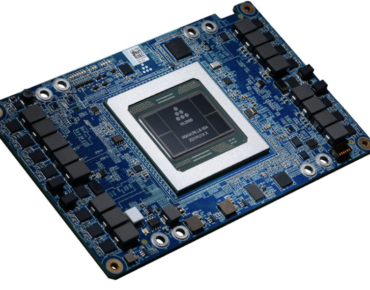Intel’s Habana Deal Expands AI Reach to Edge

Source: Habana Labs
Intel continues to expand its push into AI silicon with the acquisition of Israeli-based Habana Labs, a specialist in deep learning accelerators for datacenters—a capability Intel hopes to extend to the network edge.
The acquisition announced by Intel on Monday (Dec. 16) is valued at about $2 billion. Additional terms of the purchase were not disclosed. Intel Capital was an early investor in Habana Labs.
The deal gives Intel (NASDAQ: INTC) access to Habana’s Gaudi AI training and its Goya AI inference processor technologies. The AI training chip is currently sampling with unidentified hyperscale customers. The Goya chip announced last summer is commercially available.
Habana touts the chip combination as a development platform for deploying and differentiating AI workloads, including the ability to adjust computing, storage and networking requirements.
Intel said the acquisition supports its AI strategy aimed at expanding from datacenters out to the network edge. “Habana turbo-charges our AI offerings for the datacenter with a high-performance training processor family and a standards-based programming environment to address evolving AI workloads,” added Navin Shenoy, general manager of Intel’s Data Platforms Group.
Avigdor Willenz, Habana’s chairman, will serve as a senior adviser to the new business unit as well as to Intel. Habana will continue to be based in Israel, Intel said.
Intel pegs the AI silicon market as growing to more than $25 billion by 2024, with datacenter silicon accounting for as much as $10 billion of that total addressable market.
Market tracker Gartner Inc. estimates the global market for “AI-derived business” will approach $4 trillion by 2022.
Hence, Intel and a growing list of chip makers are targeting AI hardware as more workloads enter production. "We know that customers are looking for ease of programmability with purpose-built AI solutions, as well as superior, scalable performance on a wide variety of workloads and neural network topologies,” Intel’s Shenoy said in announcing the Habana acquisition, which had been rumored for several weeks.
Habana’s recently closed Series B funding round led by Intel Capital raised $75 million.
Related
George Leopold has written about science and technology for more than 30 years, focusing on electronics and aerospace technology. He previously served as executive editor of Electronic Engineering Times. Leopold is the author of "Calculated Risk: The Supersonic Life and Times of Gus Grissom" (Purdue University Press, 2016).











